docker-portainer Registries破解
(编辑:jimmy 日期: 2026/2/17 浏览:3 次 )
Portainer是Docker的图形化管理工具,提供状态显示面板、应用模板快速部署、容器镜像网络数据卷的基本操作(包括上传下载镜像,创建容器等操作)、事件日志显示、容器控制台操作、Swarm集群和服务等集中管理和操作、登录用户管理和控制等功能。功能十分全面,基本能满足中小型单位对容器管理的全部需求。
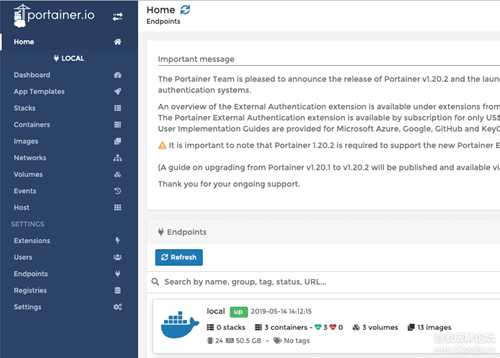
简单来说类似于一个docker的webui管理器,支持集群,非常方便,大部分功能是免费的,但是其中一个对于Registries的管理功能确实需要收费的。
你可以在docker里对其进行快速部署
[Bash shell] 纯文本查看 复制代码
$ docker volume create portainer_data$ docker run -d -p 9000:9000 -v /var/run/docker.sock:/var/run/docker.sock -v portainer_data:/data portainer/portainer
这个镜像本身连bash都没有,所以无法直接在docker里进行查看
[Bash shell] 纯文本查看 复制代码
docker cp 1eac0076a7bb:/ 你的目录
使用命令把所有内容拷贝出来,因为镜像很小,全部拷贝即可。
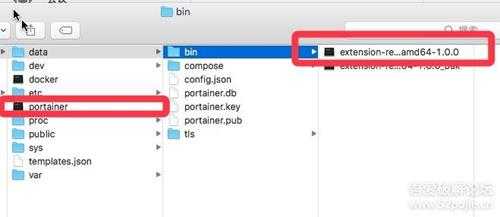
文件的目录结构如下,其中Portainer是主服务,extension-registry-management-linux-amd64-1.0.0是其中收费功能的部分。
2个都是elf文件,Portainer对其进行逆向后会发现它的git仓库地址,实际上它是开源的这部分。
在注册页面,注册失败会提示Invalid extension license key ,直接在源代码里搜索Invalid extension license key,会发现函数实现的地方
[Golang] 纯文本查看 复制代码
func validateLicense(binaryPath, licenseKey string) ([]string, error) { licenseCheckProcess := exec.Command(binaryPath, "-license", licenseKey, "-check") cmdOutput := &bytes.Buffer{} licenseCheckProcess.Stdout = cmdOutput err := licenseCheckProcess.Run() if err != nil { return nil, errors.New("Invalid extension license key") } output := string(cmdOutput.Bytes()) return strings.Split(output, "|"), nil}
其通过执行elf文件,获取输出判断是否注册成功,实际运行同理。
直接将extension-registry-management-linux-amd64-1.0.0 加载进ida, 你会发现ida没有识别任何函数,全部都是sub_xxxx, 搜索字符串发现,所有字符串都黏在一起。
这样的代码很难入手
代码是go写的于是谷歌了一波go的逆向技巧,找到了一篇非常棒的文章。
https://rednaga.io/2016/09/21/reversing_go_binaries_like_a_pro/
文章还有包含一个写好的ida脚本,不过运行会出错,看文章发现作者是6.95上写的
将出错的MAKETEXT删除后,工作正常,足够使用
[Python] 纯文本查看 复制代码
"""golang_loader_assist.py: Help IDA Pro do some golang reversing."""__author__ = "Tim 'diff' Strazzere"__copyright__ = "Copyright 2016, Red Naga"__license__ = "GPL"__version__ = "1.2"__email__ = ["strazz@gmail.com"]from idautils import *from idc import *import idaapiimport sysimport string## Constants#DEBUG = False## Utility functions#def info(formatted_string): print formatted_stringdef error(formatted_string): print 'ERROR - %s' % formatted_stringdef debug(formatted_string): if DEBUG: print 'DEBUG - %s' % formatted_string## String defining fuctionality## Indicators of string loads# mov ebx, offset aWire ; "wire" # Get string# mov [esp], ebx# mov dword ptr [esp+4], 4 # String length# mov ebx, offset unk_8608FD5 # Get string# mov [esp+8], ebx# mov dword ptr [esp+0Ch], 0Eh # String length# mov ebx, offset unk_86006E6 # Get string# mov [esp+10h], ebx# mov dword ptr [esp+14h], 5 # String length# mov ebx, 861143Ch# mov dword ptr [esp+0F0h+var_E8+4], ebx# mov [esp+0F0h+var_E0], 19h# Found in newer versions of golang binaries# lea rax, unk_8FC736# mov [rsp+38h+var_18], rax# mov [rsp+38h+var_10], 1Dh# lea rdx, unk_8F6E82# mov [rsp+40h+var_38], rdx# mov [rsp+40h+var_30], 13h# lea eax, unk_82410F0# mov [esp+94h+var_8C], eax# mov [esp+94h+var_88], 2# Currently it's normally ebx, but could in theory be anything - seen ebpVALID_REGS = ['eax', 'ebx', 'ebp', 'rax', 'rcx', 'r10', 'rdx']# Currently it's normally esp, but could in theory be anything - seen eaxVALID_DEST = ['esp', 'eax', 'ecx', 'edx', 'rsp']# TODO : Extract patternsdef is_string_load(addr): patterns = [] # Check for first parts instruction and what it is loading -- also ignore function pointers we may have renamed if (GetMnem(addr) != 'mov' and GetMnem(addr) != 'lea') and (GetOpType(addr, 1) != 2 or GetOpType(addr, 1) != 5) or GetOpnd(addr, 1)[-4:] == '_ptr': return False # Validate that the string offset actually exists inside the binary if idaapi.get_segm_name(GetOperandValue(addr, 1)) is None: return False # Could be unk_, asc_, 'offset ', XXXXh, ignored ones are loc_ or inside [] if GetOpnd(addr, 0) in VALID_REGS and not ('[' in GetOpnd(addr, 1) or 'loc_' in GetOpnd(addr, 1)) and (('offset ' in GetOpnd(addr, 1) or 'h' in GetOpnd(addr, 1)) or ('unk' == GetOpnd(addr, 1)[:3])): from_reg = GetOpnd(addr, 0) # Check for second part addr_2 = FindCode(addr, SEARCH_DOWN) try: dest_reg = GetOpnd(addr_2, 0)[GetOpnd(addr_2, 0).index('[') + 1:GetOpnd(addr_2, 0).index('[') + 4] except ValueError: return False if GetMnem(addr_2) == 'mov' and dest_reg in VALID_DEST and ('[%s' % dest_reg) in GetOpnd(addr_2, 0) and GetOpnd(addr_2, 1) == from_reg: # Check for last part, could be improved addr_3 = FindCode(addr_2, SEARCH_DOWN) # GetOpType 1 is a register, potentially we can just check that GetOpType returned 5? if GetMnem(addr_3) == 'mov' and (('[%s+' % dest_reg) in GetOpnd(addr_3, 0) or GetOpnd(addr_3, 0) in VALID_DEST) and 'offset ' not in GetOpnd(addr_3, 1) and 'dword ptr ds' not in GetOpnd(addr_3, 1) and GetOpType(addr_3, 1) != 1 and GetOpType(addr_3, 1) != 2 and GetOpType(addr_3, 1) != 4: try: dumb_int_test = GetOperandValue(addr_3, 1) if dumb_int_test > 0 and dumb_int_test < sys.maxsize: return True except ValueError: return False return Falsedef create_string(addr, string_len): if idaapi.get_segm_name(addr) is None: debug('Cannot load a string which has no segment - not creating string @ 0x%02x' % addr) return False debug('Found string load @ 0x%x with length of %d' % (addr, string_len)) # This may be overly aggressive if we found the wrong area... if GetStringType(addr) is not None and GetString(addr) is not None and len(GetString(addr)) != string_len: debug('It appears that there is already a string present @ 0x%x' % addr) MakeUnknown(addr, string_len, DOUNK_SIMPLE) if GetString(addr) is None and MakeStr(addr, addr + string_len): return True else: # If something is already partially analyzed (incorrectly) we need to MakeUnknown it MakeUnknown(addr, string_len, DOUNK_SIMPLE) if MakeStr(addr, addr + string_len): return True debug('Unable to make a string @ 0x%x with length of %d' % (addr, string_len)) return Falsedef create_offset(addr): if OpOff(addr, 1, 0): return True else: debug('Unable to make an offset for string @ 0x%x ' % addr) return Falsedef strings_init(): strings_added = 0 retry = [] text_seg = get_text_seg() if text_seg is None: debug('Failed to get text segment') return strings_added # This may be inherently flawed as it will only search for defined functions # and as of IDA Pro 6.95 it fails to autoanalyze many GO functions, currently # this works well since we redefine/find (almost) all the functions prior to # this being used. Could be worth a strategy rethink later one or on diff archs for addr in Functions(text_seg.startEA, text_seg.endEA): name = GetFunctionName(addr) end_addr = Chunks(addr).next()[1] if(end_addr < addr): error('Unable to find good end for the function %s' % name) pass debug('Found function %s starting/ending @ 0x%x 0x%x' % (name, addr, end_addr)) while addr <= end_addr: if is_string_load(addr): if 'rodata' not in idaapi.get_segm_name(addr) and 'text' not in idaapi.get_segm_name(addr): debug('Should a string be in the %s section?' % idaapi.get_segm_name(addr)) string_addr = GetOperandValue(addr, 1) addr_3 = FindCode(FindCode(addr, SEARCH_DOWN), SEARCH_DOWN) string_len = GetOperandValue(addr_3, 1) if create_string(string_addr, string_len): if create_offset(addr): strings_added += 1 else: # There appears to be something odd that goes on with IDA making some strings, always works # the second time, so lets just force a retry... retry.append((addr, string_addr, string_len)) # Skip the extra mov lines since we know it won't be a load on any of them addr = FindCode(addr_3, SEARCH_DOWN) else: addr = FindCode(addr, SEARCH_DOWN) for instr_addr, string_addr, string_len in retry: if create_string(string_addr, string_len): if create_offset(instr_addr): strings_added += 1 else: error('Unable to make a string @ 0x%x with length of %d for usage in function @ 0x%x' % (string_addr, string_len, instr_addr)) return strings_added## Function defining methods#def get_text_seg(): # .text found in PE & ELF binaries, __text found in macho binaries return _get_seg(['.text', '__text'])def get_gopclntab_seg(): # .gopclntab found in PE & ELF binaries, __gopclntab found in macho binaries return _get_seg(['.gopclntab', '__gopclntab'])def _get_seg(possible_seg_names): seg = None for seg_name in possible_seg_names: seg = idaapi.get_segm_by_name(seg_name) if seg: return seg return seg# Indicators of runtime_morestack# mov large dword ptr ds:1003h, 0 # most I've seen# mov qword ptr ds:1003h, 0 # somedef is_simple_wrapper(addr): if GetMnem(addr) == 'xor' and GetOpnd(addr, 0) == 'edx' and GetOpnd(addr, 1) == 'edx': addr = FindCode(addr, SEARCH_DOWN) if GetMnem(addr) == 'jmp' and GetOpnd(addr, 0) == 'runtime_morestack': return True return Falsedef create_runtime_ms(): debug('Attempting to find runtime_morestack function for hooking on...') text_seg = get_text_seg() if text_seg is None: debug('Failed to get text segment') return None # Opcodes for "mov large dword ptr ds:1003h, 0", binary search is faster than text search opcodes = 'c7 05 03 10 00 00 00 00 00 00' if idaapi.get_inf_structure().is_64bit(): # Opcodes for "mov qword ptr ds:dword_1000+3, 0" opcodes = '48 c7 04 25 03 10 00 00 00 00 00 00' runtime_ms_end = idaapi.find_binary(text_seg.startEA, text_seg.endEA, opcodes, 0, SEARCH_DOWN) if runtime_ms_end == BADADDR: debug('Failed to find opcodes associated with runtime_morestack: %s' % opcodes) return None runtime_ms = idaapi.get_func(runtime_ms_end) if runtime_ms is None: debug('Failed to get runtime_morestack function from address @ 0x%x' % runtime_ms_end) return None if idc.MakeNameEx(runtime_ms.startEA, "runtime_morestack", SN_PUBLIC): debug('Successfully found runtime_morestack') else: debug('Failed to rename function @ 0x%x to runtime_morestack' % runtime_ms.startEA) return runtime_msdef traverse_xrefs(func): func_created = 0 if func is None: return func_created # First func_xref = idaapi.get_first_cref_to(func.startEA) # Attempt to go through crefs while func_xref != BADADDR: # See if there is a function already here if idaapi.get_func(func_xref) is None: # Ensure instruction bit looks like a jump func_end = FindCode(func_xref, SEARCH_DOWN) if GetMnem(func_end) == "jmp": # Ensure we're jumping back "up" func_start = GetOperandValue(func_end, 0) if func_start < func_xref: if idc.MakeFunction(func_start, func_end): func_created += 1 else: # If this fails, we should add it to a list of failed functions # Then create small "wrapper" functions and backtrack through the xrefs of this error('Error trying to create a function @ 0x%x - 0x%x' %(func_start, func_end)) else: xref_func = idaapi.get_func(func_xref) # Simple wrapper is often runtime_morestack_noctxt, sometimes it isn't though... if is_simple_wrapper(xref_func.startEA): debug('Stepping into a simple wrapper') func_created += traverse_xrefs(xref_func) if idaapi.get_func_name(xref_func.startEA) is not None and 'sub_' not in idaapi.get_func_name(xref_func.startEA): debug('Function @0x%x already has a name of %s; skipping...' % (func_xref, idaapi.get_func_name(xref_func.startEA))) else: debug('Function @ 0x%x already has a name %s' % (xref_func.startEA, idaapi.get_func_name(xref_func.startEA))) func_xref = idaapi.get_next_cref_to(func.startEA, func_xref) return func_createddef find_func_by_name(name): text_seg = get_text_seg() if text_seg is None: return None for addr in Functions(text_seg.startEA, text_seg.endEA): if name == idaapi.get_func_name(addr): return idaapi.get_func(addr) return Nonedef runtime_init(): func_created = 0 if find_func_by_name('runtime_morestack') is not None: func_created += traverse_xrefs(find_func_by_name('runtime_morestack')) func_created += traverse_xrefs(find_func_by_name('runtime_morestack_noctxt')) else: runtime_ms = create_runtime_ms() func_created = traverse_xrefs(runtime_ms) return func_created## Function renaming fuctionality#def create_pointer(addr, force_size=None): if force_size is not 4 and (idaapi.get_inf_structure().is_64bit() or force_size is 8): MakeQword(addr) return Qword(addr), 8 else: MakeDword(addr) return Dword(addr), 4STRIP_CHARS = [ '(', ')', '[', ']', '{', '}', ' ', '"' ]REPLACE_CHARS = ['.', '*', '-', ',', ';', ':', '/', '\xb7' ]def clean_function_name(str): # Kill generic 'bad' characters str = filter(lambda x: x in string.printable, str) for c in STRIP_CHARS: str = str.replace(c, '') for c in REPLACE_CHARS: str = str.replace(c, '_') return strdef renamer_init(): renamed = 0 gopclntab = get_gopclntab_seg() if gopclntab is not None: # Skip unimportant header and goto section size addr = gopclntab.startEA + 8 size, addr_size = create_pointer(addr) addr += addr_size # Unsure if this end is correct early_end = addr + (size * addr_size * 2) while addr < early_end: func_offset, addr_size = create_pointer(addr) name_offset, addr_size = create_pointer(addr + addr_size) addr += addr_size * 2 func_name_addr = Dword(name_offset + gopclntab.startEA + addr_size) + gopclntab.startEA func_name = GetString(func_name_addr) appended = clean_func_name = clean_function_name(func_name) debug('Going to remap function at 0x%x with %s - cleaned up as %s' % (func_offset, func_name, clean_func_name)) if idaapi.get_func_name(func_offset) is not None: if MakeName(func_offset, clean_func_name): renamed += 1 else: error('clean_func_name error %s' % clean_func_name) return renamed# Function pointers are often used instead of passing a direct address to the# function -- this function names them based off what they're currently named# to ease reading## lea rax, main_GetExternIP_ptr <-- pointer to actual function# mov [rsp+1C0h+var_1B8], rax <-- loaded as arg for next function# call runtime_newproc <-- function is used inside a new processdef pointer_renamer(): renamed = 0 text_seg = get_text_seg() if text_seg is None: debug('Failed to get text segment') return renamed for addr in Functions(text_seg.startEA, text_seg.endEA): name = GetFunctionName(addr) # Look at data xrefs to the function - find the pointer that is located in .rodata data_ref = idaapi.get_first_dref_to(addr) while data_ref != BADADDR: if 'rodata' in idaapi.get_segm_name(data_ref): # Only rename things that are currently listed as an offset; eg. off_9120B0 if 'off_' in GetTrueName(data_ref): if MakeName(data_ref, ('%s_ptr' % name)): renamed += 1 else: error('error attempting to name pointer @ 0x%02x for %s' % (data_ref, name)) data_ref = idaapi.get_next_dref_to(addr, data_ref) return renameddef main(): # This should be run before the renamer, as it will find and help define more functions func_added = runtime_init() info('Found and successfully created %d functions!' % func_added) # This should prevent the script from locking up due to the auto initalizer idaapi.autoWait() # Should be run after the function initializer, renamed = renamer_init() info('Found and successfully renamed %d functions!' % renamed) # Attempt to rename all function pointers after we have all the functions and proper function names pointers_renamed = pointer_renamer() info('Found and successfully renamed %d function pointers!' % pointers_renamed) # Attempt to find all string loading idioms strings_added = strings_init() info('Found and successfully created %d strings!' % strings_added)if __name__ == "__main__": main()
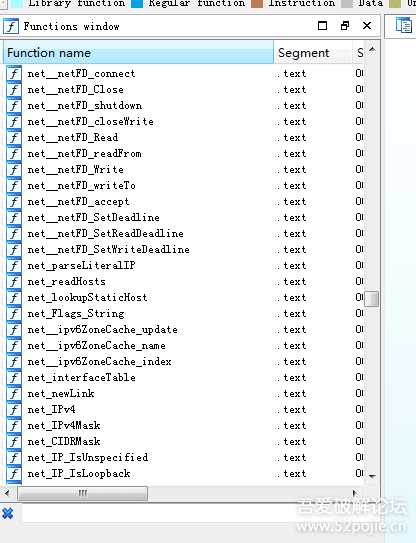
函数重命名后如上,函数逻辑清晰可见
根据之前的源代,在linux下测试运行该程序。
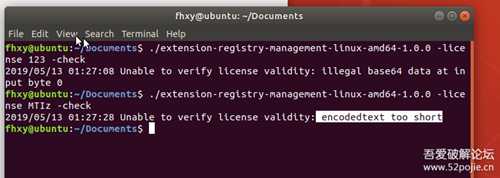
直接搜索main函数,即可发现函数主要处理的部分
参数为 binaryPath, "-license", licenseKey, "-check" 程序检查key是否正确,用户注册时候key使用
参数为 binaryPath, "-license", extension.License.LicenseKey 检查key是否正确,正确即启动服务,正常工作时候使用。,
这里逻辑已经很简单了,直接在linux上进行动态调试,慢慢根据线索修改跳转即可完成。
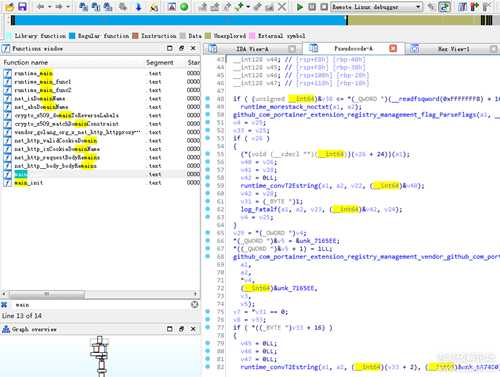
将破解好的elf文件重新复制回docker,注册使用即可。
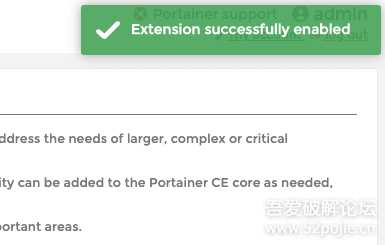
成品如下太大权限不够上传,按着步骤做一遍应该即可。
下一篇:关于小生我怕怕第六课的一个CrackMe的破解